WHY KIDS ON THE SPECTRUM ARE MORE LIKELY TO BE PERFECTIONISTS AND WHAT YOU CAN DO TO SUPPORT THEM
Many students on the spectrum like everything to be perfect. That is perfectionism perceived by them. This is often due to their literal thinking and one- track mind. This can lead to many challenges at home and school. For example; getting frustrated, not wanting to try new or different things, rigid thinking (I need to be first, I need to win), anxiety (I am a failure, I can’t do x), disengaged, not handing in work as never “finished” to their standard.
Many people on the spectrum often have difficulty with “cognitive flexibility”, in other words they have a one-track mind as their thinking tends to be rigid and not adapt to failure or change.
This one-track mind can often manifest itself into refusal to try new concepts and activities. A one-track mind can look like
- Student continues using incorrect strategies and not learning from mistakes
- Not listening to advice
- Compulsion for completion
- Not able to see other problem solving options
This can often result in the student trying the same approach to fix a problem over and over again. This repetitive nature can quickly lead to frustration when the approach is not effective at solving the problem.
It is important to teach students that it is OK to make mistakes and when we make mistakes we should try alternative solutions rather than sticking with that one-track mindset.
Different Types of Mistakes
It is important to teach that there are different types of mistakes – social (hurt someone’s feelings, interrupt someone) or work/school mistakes and that different mistakes require different reactions.
When we are trying to engage children or encourage them to participate this inflexible thinking can be a barrier to learning. The challenges of “inflexible thinking” are students can make the same mistakes over and over, can’t see an alternative option or opinion, or get frustrated when corrected as they believe they are correct. There are a range of strategies we can use to support understanding and therefore encourage trying ‘new activities’ or ‘giving it a go’
11 Ways to Decrease Frustration When Making Mistakes
To encourage problem solving choose a day when the student is stressed and purposefully make a mistake.
1. Role model making mistakes.
Teachers, Parents, you know it’s OK to make a mistake! Show this to the students you know.
As a role model it is important to ‘make’ mistakes in front of the student and to show how you cope with making that mistake. For example, when writing on the blackboard make a spelling error and say “Oh… I’ve made a mistake” loudly, in a matter of fact tone and to the whole class. Make a point of crossing out the word and using positive reinforcement such as “that’s alright I can fix it” and continue your lessons. You are modelling how to neatly cross out a mistake at the same time (instead of scribble that would normally appear).
It is important that this is done in a matter of fact tone to reinforce that:
-
Mistakes happen
-
We fix the mistake
-
We then move on
-
Everyone can and does make mistakes
I recommend doing this several times a week to reinforce that you don’t have to be perfect all the time and that it is OK to make mistakes.
This is just one example. Remember to be creative and use what works best in your classroom or your family (e.g. could try making mistakes when driving such as forgetting to turn at the right time, get the wrong ingredient out when cooking, making a wrong move when playing a game)
2. Plan B
Get the student to talk through what their Plan B and Plan C etc will be if their current strategy fails. This can help reduce anxiety if the student makes a mistake as there will be a fall back solution.
3. Over dramatise making mistakes and how to correct them
Students on the spectrum often do not notice when someone else makes a mistake and fixing it up. This makes it difficult to fix up their own mistakes as they don’t have a range of different ideas they have seen modelled by other people. By over dramatising this process it is more likely the student will be able to notice how others cope with making mistakes and learn from this.
4. Break activities into smaller achievable steps. This way it doesn’t all seem “too hard” “or overwhelming”
5. Use social stories to support understanding / making social mistakes. Ie “How to say Sorry” “What to do if you interrupt someone” or “How to ask for help”
6. Tell what to do, not what not to do. This gives “solution” driven phrases rather than negative e.g. put your hand up vs don’t call out.
7. Growth Mindset Phrases, Mantras, Posters, Reminders
“Mistakes help me grow”
When I make a mistake, I say “I can’t do it YET!” and try again
“I can ask for help when I need it”
“I learn from my mistakes”
Link to “Your Words Matter”
8. Change your language, instead of saying “wrong” “mistake” … “try again” “can you have another go at this one” “nearly there, just one thing we need to fix”
9. Instead of putting an X for mistakes, try putting a circle around the mistake and call it “Opportunity for learning”
10. Show other students work that includes mistakes, that aren’t perfect, show how they have fixed mistakes or had a go at new things
11. Watch TV Reality Shows where people make mistakes – “Masterchef” “Bake off” “The Block” etc
Many people on the spectrum say they love seeing other people’s anxiety and how they solve problems under stress. I suspect because these shows are dramatised, it makes them notice the emotions and solutions more clearly.
Want more? Check out the Sue Larkey Blog for lots of tips and advice.
-
Practical Sensory Programmes
$54.95 -
Practical Communication Programmes
$44.95 -
Teacher Assistants Big Red Book of Ideas
$39.95 -
The Essential Guide to Secondary School
$44.95 -
Tips for Toileting
$29.95 -
Making it a Success
$39.95 -
Teacher Assistants Big Blue Book of Ideas
$39.95 -
The Ultimate Guide to School and Home
$44.95
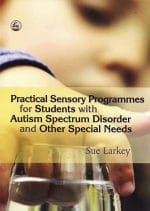
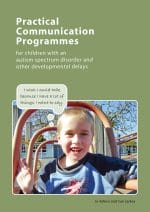

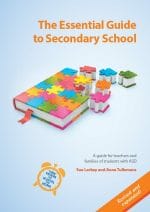
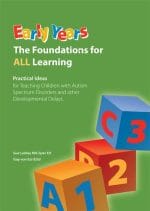
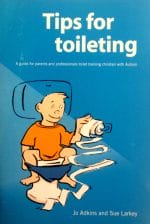
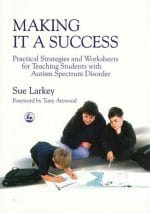
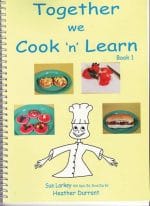
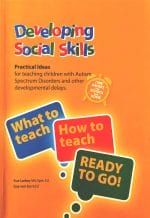

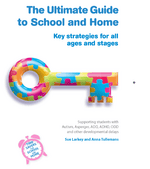

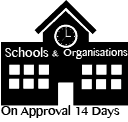
 For all orders outside Australia please email
For all orders outside Australia please email 